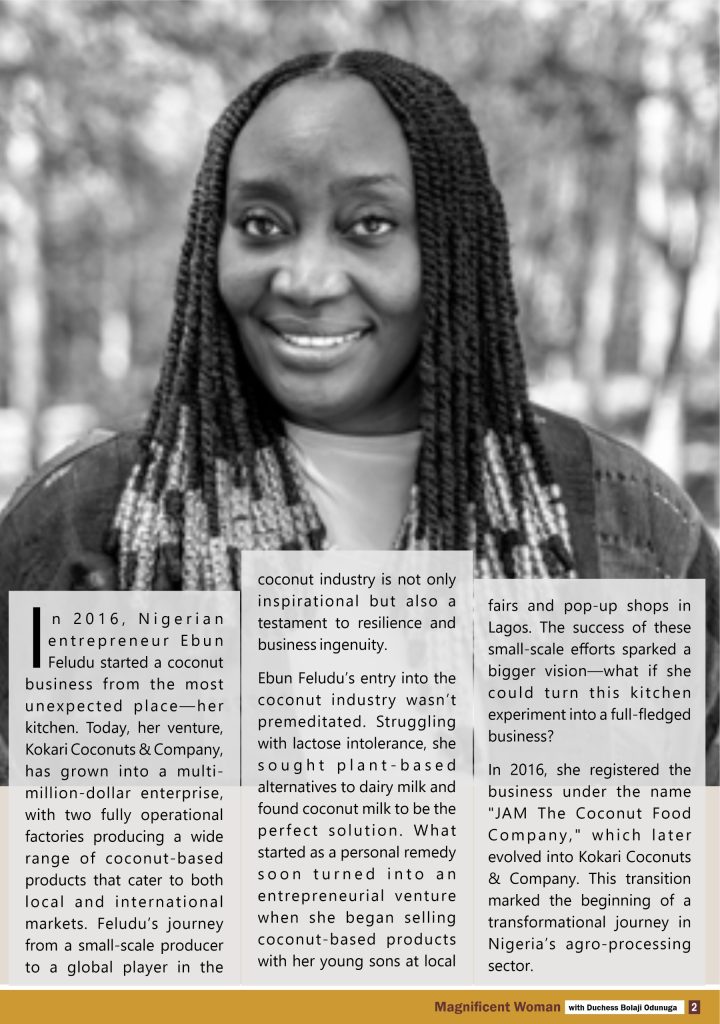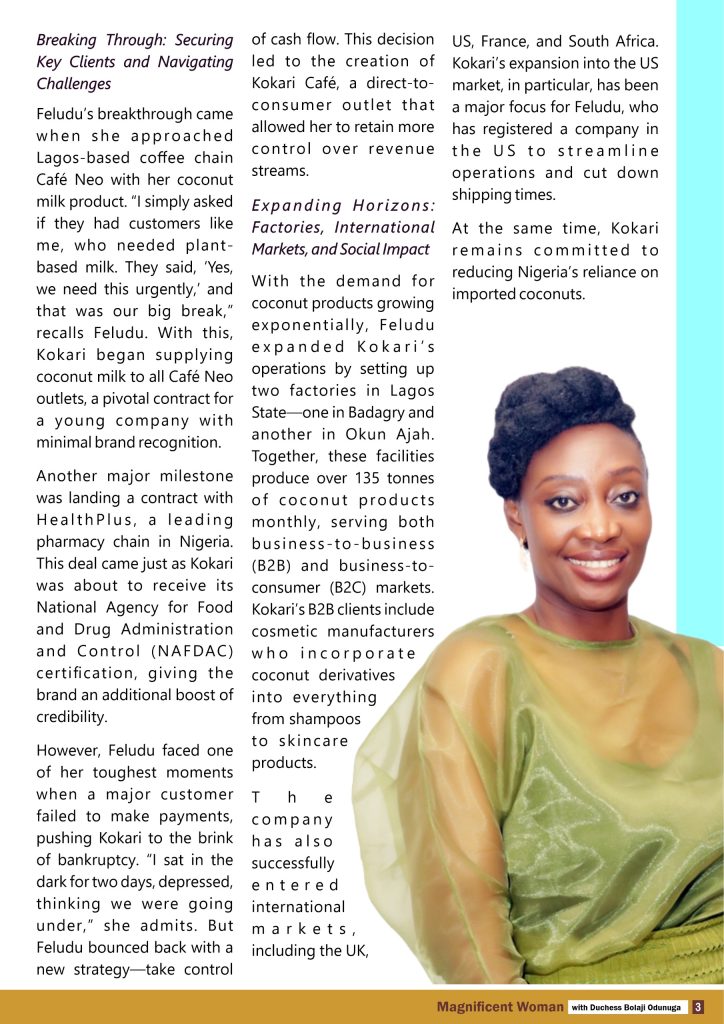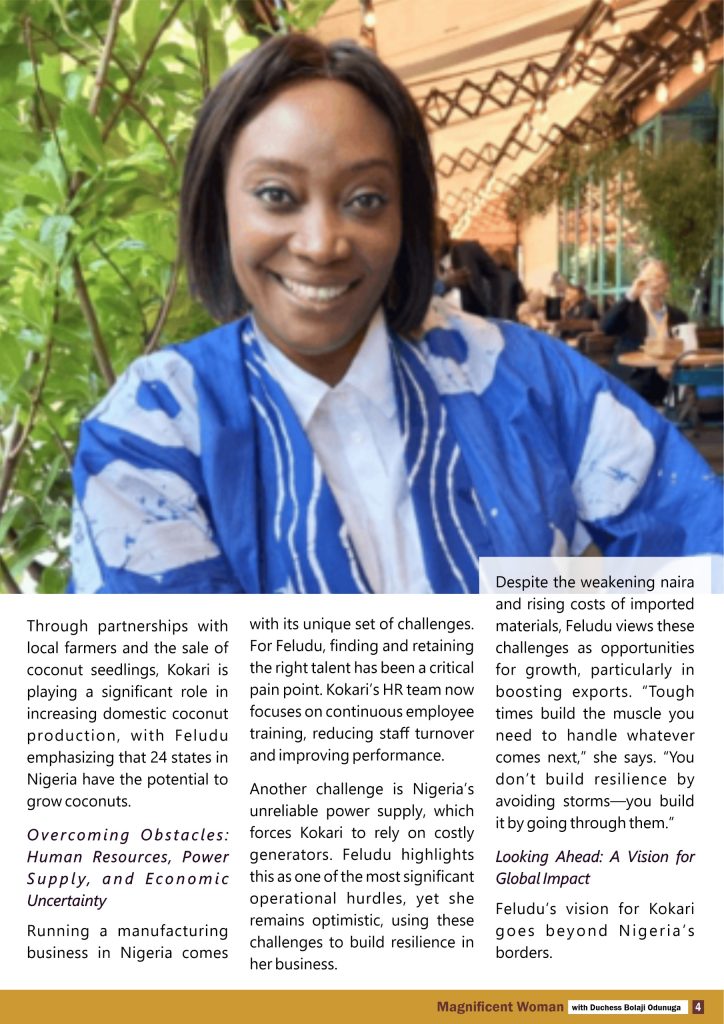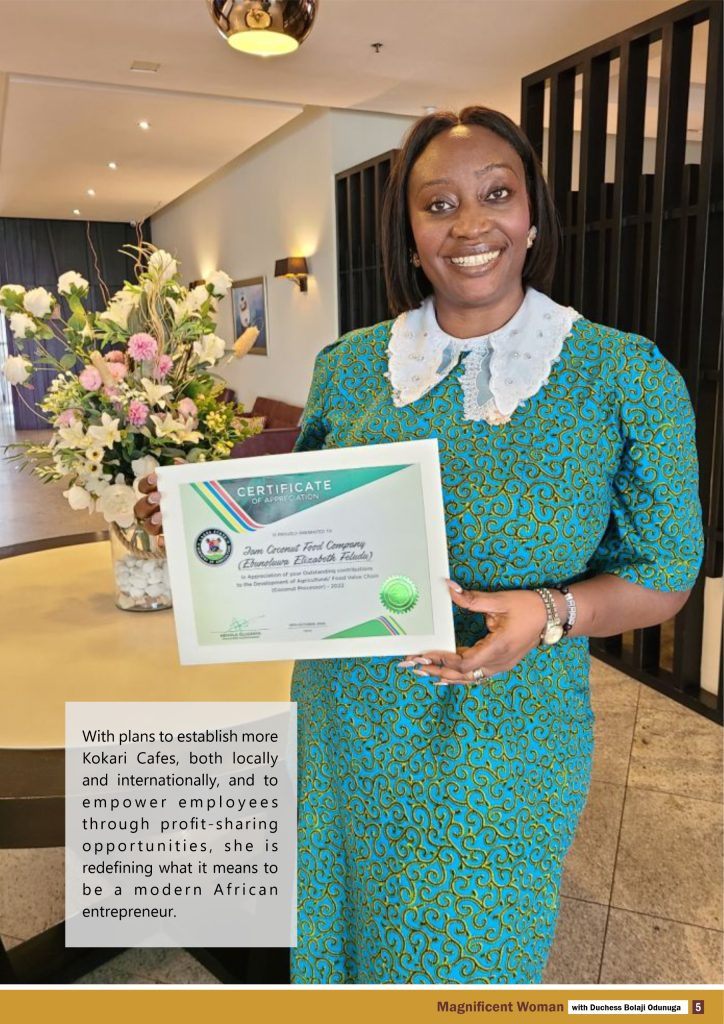In 2016, Nigerian entrepreneur Ebun Feludu started a coconut business from the most unexpected place—her kitchen. Today, her venture, Kokari Coconuts & Company, has grown into a multi-million-dollar enterprise, with two fully operational factories producing a wide range of coconut-based products that cater to both local and international markets. Feludu’s journey from a small-scale producer to a global player in the coconut industry is not only inspirational but also a testament to resilience and business ingenuity.
Ebun Feludu’s entry into the coconut industry wasn’t premeditated. Struggling with lactose intolerance, she sought plant-based alternatives to dairy milk and found coconut milk to be the perfect solution. What started as a personal remedy soon turned into an entrepreneurial venture when she began selling coconut-based products with her young sons at local fairs and pop-up shops in Lagos. The success of these small-scale efforts sparked a bigger vision—what if she could turn this kitchen experiment into a full-fledged business?

In 2016, she registered the business under the name “JAM The Coconut Food Company,” which later evolved into Kokari Coconuts & Company. This transition marked the beginning of a transformational journey in Nigeria’s agro-processing sector.
Breaking Through: Securing Key Clients and Navigating Challenges
Feludu’s breakthrough came when she approached Lagos-based coffee chain Café Neo with her coconut milk product. “I simply asked if they had customers like me, who needed plant-based milk. They said, ‘Yes, we need this urgently,’ and that was our big break,” recalls Feludu. With this, Kokari began supplying coconut milk to all Café Neo outlets, a pivotal contract for a young company with minimal brand recognition.
Another major milestone was landing a contract with HealthPlus, a leading pharmacy chain in Nigeria. This deal came just as Kokari was about to receive its National Agency for Food and Drug Administration and Control (NAFDAC) certification, giving the brand an additional boost of credibility.

However, Feludu faced one of her toughest moments when a major customer failed to make payments, pushing Kokari to the brink of bankruptcy. “I sat in the dark for two days, depressed, thinking we were going under,” she admits. But Feludu bounced back with a new strategy—take control of cash flow. This decision led to the creation of Kokari Café, a direct-to-consumer outlet that allowed her to retain more control over revenue streams.
Read more:
The Nigerian Japa Syndrome: Myths and Truths (I)
Meet 68-Years-Old “Alhaja Photo”: The Oldest Photographer at Ooni-of-Ife’s Palace
Nigeria’s New HOCS Didi Esther Walson-Jack: Very Mindful, Very Competent, Very Magnificent
Expanding Horizons: Factories, International Markets, and Social Impact

With the demand for coconut products growing exponentially, Feludu expanded Kokari’s operations by setting up two factories in Lagos State—one in Badagry and another in Okun Ajah. Together, these facilities produce over 135 tonnes of coconut products monthly, serving both business-to-business (B2B) and business-to-consumer (B2C) markets. Kokari’s B2B clients include cosmetic manufacturers who incorporate coconut derivatives into everything from shampoos to skincare products.
The company has also successfully entered international markets, including the UK, US, France, and South Africa. Kokari’s expansion into the US market, in particular, has been a major focus for Feludu, who has registered a company in the US to streamline operations and cut down shipping times.
At the same time, Kokari remains committed to reducing Nigeria’s reliance on imported coconuts. Through partnerships with local farmers and the sale of coconut seedlings, Kokari is playing a significant role in increasing domestic coconut production, with Feludu emphasizing that 24 states in Nigeria have the potential to grow coconuts.
Overcoming Obstacles: Human Resources, Power Supply, and Economic Uncertainty
Running a manufacturing business in Nigeria comes with its unique set of challenges. For Feludu, finding and retaining the right talent has been a critical pain point. Kokari’s HR team now focuses on continuous employee training, reducing staff turnover and improving performance.
Another challenge is Nigeria’s unreliable power supply, which forces Kokari to rely on costly generators. Feludu highlights this as one of the most significant operational hurdles, yet she remains optimistic, using these challenges to build resilience in her business.
Despite the weakening naira and rising costs of imported materials, Feludu views these challenges as opportunities for growth, particularly in boosting exports. “Tough times build the muscle you need to handle whatever comes next,” she says. “You don’t build resilience by avoiding storms—you build it by going through them.”
Looking Ahead: A Vision for Global Impact

Feludu’s vision for Kokari goes beyond Nigeria’s borders. With plans to establish more Kokari Cafes, both locally and internationally, and to empower employees through profit-sharing opportunities, she is redefining what it means to be a modern African entrepreneur.





